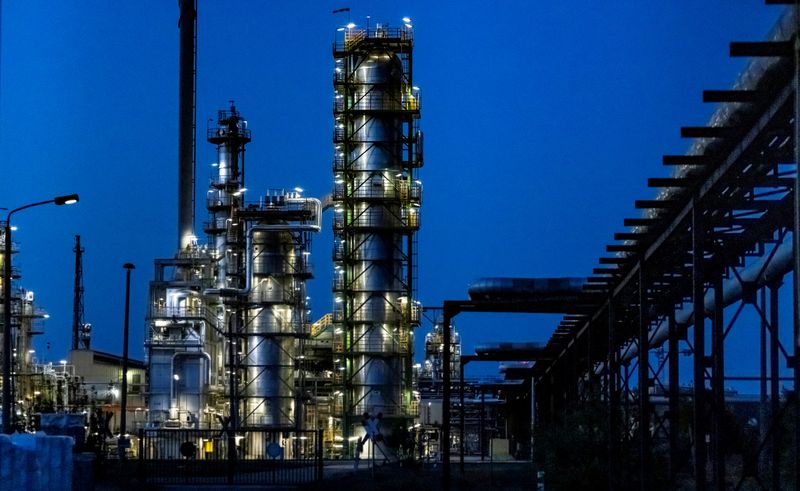By Rowena Edwards and Bozorgmehr Sharafedin
LONDON (Reuters) - Diesel drivers in Europe, already contending with record high prices, are in for even more pain at the pumps compared with those who rely on gasoline.
Restrictions on diesel imports from Russia following Moscow's invasion of Ukraine have undermined the fuel’s status in Europe as a cheaper alternative to petrol, amplifying a cost of living crisis across the region.
"Fundamentally, Europe can't really survive without Russian diesel," lead clean products analyst at Kpler Kevin Wright said.
In addition to the direct impact on the estimated 140 million diesel motorists filling up in Europe, high diesel prices affect the wider economy and inflation as it is the preferred fuel of industry and farmers.
Fuel prices have widely rebounded from pandemic lows as the easing of lockdown measures spurred demand and refiners struggled to keep pace.
Following Moscow's invasion of Ukraine on Feb. 24, Western sanctions on Russia, a major energy exporter and the biggest supplier of diesel to Europe have tightened already strained supplies.
Concern about disruption to Russian diesel exports pushed average diesel prices at European pumps higher than gasoline in March for the first time and the gap is expected to widen, leading to successive price records.
Diesel’s premium to gasoline will reach around $25 per barrel (bbl) in the fourth quarter from around $13/bbl in the second quarter, data compiled from Energy Aspects and Wood Mackenzie showed.
"If you're driving a diesel powered vehicle you're probably going to get hit a little bit harder than if it's gasoline," Eugene Lindell, refining and products market analyst at FGE, said.
It's a particularly European problem.
The percentage of passenger cars that use diesel accounts for more than 40% of the European market, compared to 4.5% in the United States, according to Rystad Energy data.
The full impact of the energy market disruption linked to Russia's invasion, which Moscow terms a "special military operation" has yet to be felt.
EU leaders at the end of May agreed to cut 90% of oil imports from Russia by the end of this year as the bloc seeks to end its dependence on Russian energy.
The phased-in sanctions mean all seaborne Russian crude will be banned from early December and all Russian refined products two months later.
Many companies have already stopped buying Russian fuel and begun seeking alternatives.
One consequence is that European refineries are likely to be producing more gasoline compared with diesel.
European refiners seeking replacements for Russian Urals have turned to lighter, sweeter crudes, which yield gasoline rather than heavier diesel.
As a result, analysts see gasoline prices easing in the fourth quarter as seasonal demand drops, while diesel is likely to stay expensive.
"As European refiners continue to rely on light crude supplies to maximise diesel production, high gasoline supplies will likely continue to an extent, keeping global supplies ample as gasoline-rich crudes especially from West Africa, Caspian and the United States," energy analytics firm Vortexa said.
Meanwhile, European diesel imports from Russia have continued and hit 825,163 barrels per day (bpd) in the 1-19 July period, the highest since March, Vortexa said.
For June, diesel imports from Russia were only 10% below the 2017-2021 average.
EUROPE'S DIESEL LOVE AFFAIR IS OVER
Europe’s diesel dependency follows a policy adopted 25 years ago by EU countries to incentivise the purchase of diesel cars with tax breaks in the hope of reducing carbon dioxide emissions.
The shift from gasoline to diesel, which contains more energy by volume than gasoline, made the European vehicle fleet more efficient, but as the dieselgate scandal, made public in 2015, underlined diesel emits high levels of nitrogen oxide emissions and other air pollutants.
The rising cost of diesel is likely to exaggerate a shift away from diesel vehicles, although longer term, Europe is seeking to stop sales of all new fossil fuel cars from 2035.
A shift from diesel to gasoline cars has already been evident for several years, Rimoon Agaiby, head of Germany in the strategic consulting team at engineering and automotive consultancy Ricardo, said.
"Any differential in diesel price over gasoline would only be expected to support this trend," Agaiby added.
Data on the used car market suggests more people are trying to sell diesel vehicles compared with gasoline ones.
Online used car marketplace Motorway found the sale of second-hand diesel cars increased by 21% from May to June, compared to 13% increase in petrol cars.
While electric vehicles may eventually provide a solution, in the near term, the pain for Europe's consumers is likely to be increased by the wider impact on Europe's commercial fleet, which for now has no cost-effective substitute for diesel.

Already in June the cost of food in Europe increased by more than 11% year-on-year, Eurostat figures show, as diesel was one of many factors increasing production costs, which ultimately are passed on to consumers.
"Agricultural production and food processing is energy intensive, for instance, crop production relies heavily on fuel for agricultural machinery… (and) rising transportation cost affect food prices,” the European Central Bank (ECB) said in a June report.